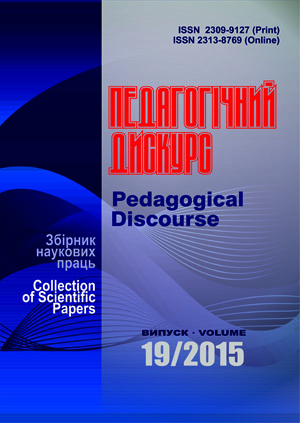Ways to Improve the Quality of Professional Training of Future Specialists of Law Enforcement Branch
Abstract
The article substantiates the necessity to search for the ways to improve the quality of training of future specialists of law enforcement branch. It considers the features of their professional activity which determine the choice of directions to improve the quality of their training for professional activity.
Identified are the basic directions that will allow improving the quality of training of future law enforcers for their professional activity in conditions of higher educational establishment. These basic directions include: use of information technologies in educational process, application of multimedia learning facilities, use of interactive methods and forms of training classes.
The article defines the essence of the concept «information technologies of education»; shows their didactic properties (interactivity, feedback, increased intellectuality of educational process; increase in information competence of the participants of the educational process).
Presented are the possibilities of using multimedia learning facilities in educational process as one of the directions to improve the quality of training of future specialists of law enforcement branch. Described are various types of multimedia learning facilities: multimedia presentation, multimedia textbook (manual), multimedia learning programs and multimedia trainers; they all help to increase the level of mastering the educational material.
Asserted is the use of interactive methods and forms of learning as an important way to improve the quality of training of cadets for their professional activity. The application of interactive methods and forms of training enables to simulate the conditions of future professional activity. Suggested is the classification of interactive methods of training which are expedient to use in the process of training cadets for their professional activity (lectures-dialogues, group dialogues, role dialogues, situational simulation, brainstorming, method of analysis of specific situations, professional-psychological training).
The article concludes that the most effective approach is combination and variational use of all three ways (directions) to improve the quality of training of future specialists of law enforcement branch in educational process.
Downloads
References
Diakonov G. Aktivnye metody grupovogo obycheniya psikhologii (Active methods of psychology group training: dialog approach). – Kirovograd «Imex-LTD», 2004. – 270 p. [in Russian]
Zhuk Y. Systemni osobluvosti osvitnogo seredovyshha yak obektu informatyzaczii (Educational environment system features as an object of informatisation) // Postgraduate education in Ukraine. – 2002. – № 2. – pp. 35-37. [in Ukrainian]
Klevczova N. Metodico-didacticheskie princzipy sozdaniya i ispolzovaniya multimediynykh prezentacziy v obuchenii inostrannomu yazyku (Methodological and didactic principles of multimedia presentations creation and use in foreign language learning). – Kursk, 2003. – 189 p. [in Russian]
Melamud V. Osobennosti, nekotorye napravleniya i tendenczii primeneniya informaczionnykh tekhnologiy v sovremennom obrazovanii (Features, some directions and trends in the information technologies application in modern education) // Psychology World. Scientific-methodical journal. – 2006. – № 2 (38) – pp. 242-243. [in Russian]
Chernyshenko O. Vprovadzhennya tekhnologiy multimedia v proczesi profesiynoi pidgotovky ofitseriv vnutrishnikh viisk MVS Ukrainy (Multimedia technologies implementation in the process of training of future officers of the Ministry of Internal affaires of Ukraine ) // Pedagogy and Psychology: collection of scientific works. − H.: HNPU named after G.S.Skovoroda, 2012. − Vol. 42. − pp. 70-74. [in Ukrainian]

















